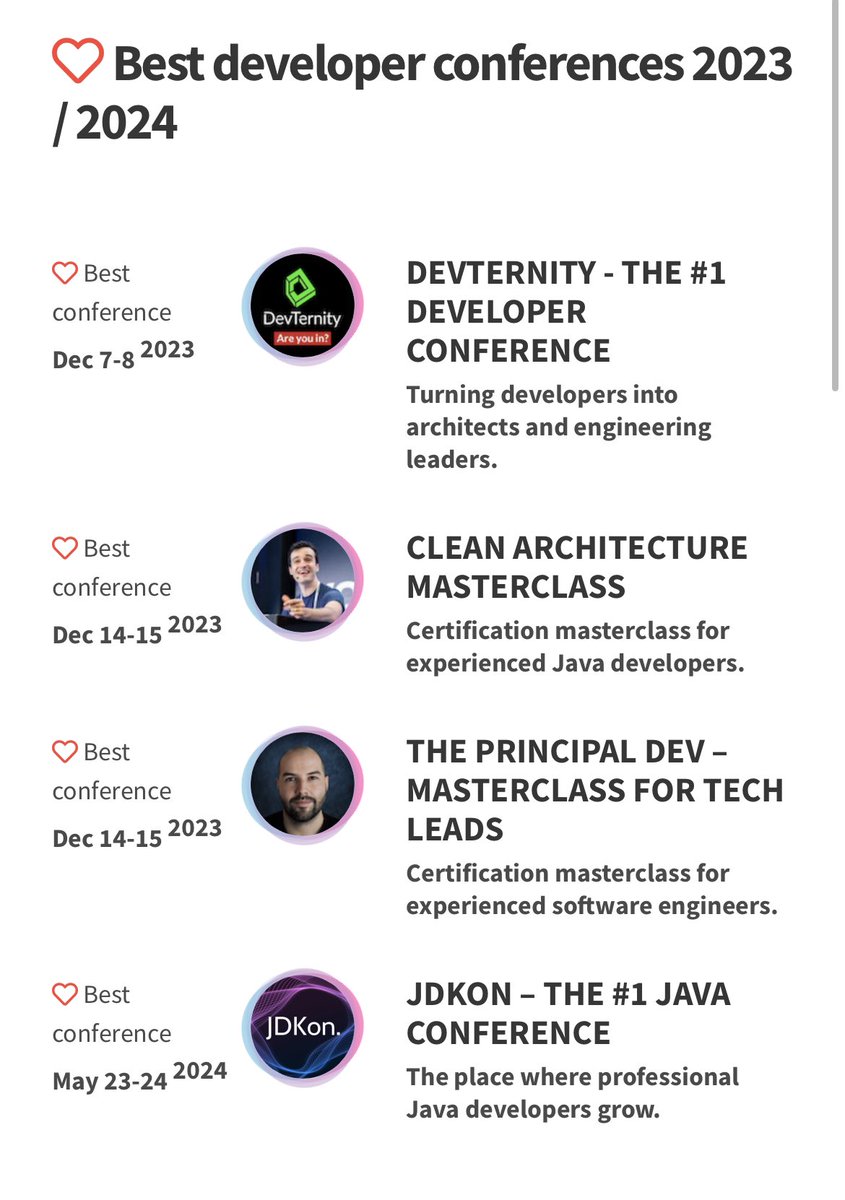Imagine a tech conference having no CFP, as they reach out to speakers directly. They successfully attract some of the most heavy hitter men speakers in tech, and 3 women speakers.
Now imagine my surprise that 2 of those women are FAKE profiles.
They do not exist.
Nada.
Now imagine my surprise that 2 of those women are FAKE profiles.
They do not exist.
Nada.
I contacted speakers I know about this.
They had no idea.
One of the fake women profiles is supposedly a core Ethereum contributor, and a staff engineer at Coinbase.
No such contributor, no one heard of her at Coinbase now or before.
Why do this?
They had no idea.
One of the fake women profiles is supposedly a core Ethereum contributor, and a staff engineer at Coinbase.
No such contributor, no one heard of her at Coinbase now or before.
Why do this?
Sad to say but going forward if you are invited to speak at a lesser-know conference: do your diligence… if other listed speakers actually exist?!
This is a paid online conference, large number of (paid) attendees, workshops sold out.
What a mess.
This is a paid online conference, large number of (paid) attendees, workshops sold out.
What a mess.
Just to be very clear this is about the organisers creating fake profiles.
https://twitter.com/gergelyorosz/status/1728181772406739107
To spell it out why this conference generated fake women speakers. Because the organizer wants big names and it probably seemed like an easy way to address their diversity concerns.
Incredibly lazy.
Incredibly lazy.
https://twitter.com/gergelyorosz/status/1728188831139295719
Which conference?
Well, where Anna Boyko, Staff engineer at Coinbase and Ethereum core contributor is a speaker.
Her. She doesn’t exist. Except as a listed speaker at a prominent online conference!
Well, where Anna Boyko, Staff engineer at Coinbase and Ethereum core contributor is a speaker.
Her. She doesn’t exist. Except as a listed speaker at a prominent online conference!

Or another Java conference by the exact same organizer where Microsoft MVP and WhatsApp senior engineer Alina Prokhoda is a featured speaker.
Would you know there is no such Microsoft MVP and Meta employee.
Speakers listed on these conference had no idea I talked with…
Would you know there is no such Microsoft MVP and Meta employee.
Speakers listed on these conference had no idea I talked with…

This conference doesn’t have a call for papers because they follow the “Hollywood principle” (that sounds made up btw)
But then do AI generated images, fake names and titles for some fake women speakers profiles… and I cannot fathom WHY.
Absolute laziness and dubious ethics.
But then do AI generated images, fake names and titles for some fake women speakers profiles… and I cannot fathom WHY.
Absolute laziness and dubious ethics.

If you bought tickets to DevTernity (“DevTernity”) on 7-8 Dec you’ve been duped with fake speaker Anna Boyle who is still on the website. A made up profile, AI image, no such staff eng at Coinbase.
And some other listed women speakers don’t actually talk
devternity.com
And some other listed women speakers don’t actually talk
devternity.com
And if you are planning to buy tickets to JDKon 2024 (#1 international conference designed specifically for professional Java developers.) on 22-24 May 2024: save your money because Alina Prokhoda doesn’t exist either.
This conf:
Same organizer.dev.events/conferences/ta…
This conf:
Same organizer.dev.events/conferences/ta…
Anything organized by “Dev events” is by the same organizer who creates these fake women speakers (and has some in the past as well) for some mysterious reason.
All their conferences:
I would avoid like the plague with such dubious ethics.
Why?? dev.events

All their conferences:
I would avoid like the plague with such dubious ethics.
Why?? dev.events

What do you know - after being called out, the organizer is removing some fake women profiles.
Here’s the archived website. Fake Anna Boyle (staff eng at a Coinbase, core Ethereum contributor) was there for only 10 months, while most tickets were sold.
web.archive.org/web/2023110914…
Here’s the archived website. Fake Anna Boyle (staff eng at a Coinbase, core Ethereum contributor) was there for only 10 months, while most tickets were sold.
web.archive.org/web/2023110914…
DevTernity has had fake women speakers listed for years.
Here is fake Anna Boyle’s “colleague” fake Natalie Stadler claimed to be at Coinbase (no such person ever worked there ofc - I checked).
She “spoke” in 2022 there as well.
Just incredible.
web.archive.org/web/2021112802…

Here is fake Anna Boyle’s “colleague” fake Natalie Stadler claimed to be at Coinbase (no such person ever worked there ofc - I checked).
She “spoke” in 2022 there as well.
Just incredible.
web.archive.org/web/2021112802…

The website had a public GitHub repo where you could see the full edit history that someone found and pointed to me.
You could see eg how fake Anna was added 10 months ago. Or how after being called out for what it is, the organizer removed fake women speaker profiles.


You could see eg how fake Anna was added 10 months ago. Or how after being called out for what it is, the organizer removed fake women speaker profiles.


The organizer responded, claiming he tried so hard to get women speakers but it’s… too hard. For a paid (!) conference w a price of €789 / $870 per person.
Meanwhile others just… invite a variety of people, including so many women. They exist. If you actually care that is.
Meanwhile others just… invite a variety of people, including so many women. They exist. If you actually care that is.
https://twitter.com/shanselman/status/1728490427115073609
The conference website is up and fake Anna removed.
But fake Julia is still there. Listed every year as a speaker, never delivered a talk any year (and “dropped out” this year as well) @lizthegrey did some digging.
A fake catfishing profile, it seems.
linkedin.com/posts/efong_ge…

But fake Julia is still there. Listed every year as a speaker, never delivered a talk any year (and “dropped out” this year as well) @lizthegrey did some digging.
A fake catfishing profile, it seems.
linkedin.com/posts/efong_ge…

@lizthegrey This is Julia’s Xing profile (basically LinkedIn for Germany). She is/was an architect at Uber Estonia?!
Uber never had no eng office in Estonia. No such person ever worked at Uber.
On LinkedIn, her profile used to have Microsoft in the past as well.
xing.com/profile/Julia_…

Uber never had no eng office in Estonia. No such person ever worked at Uber.
On LinkedIn, her profile used to have Microsoft in the past as well.
xing.com/profile/Julia_…

@lizthegrey The organizer claims they 1x accidentally added a fake speaker to their conferences. But actually:
2021 & 2022: fake Natalie & Julia
2023: fake Anna, Alina & Julia
All listed as speakers. Never delivered a talk. Not removed from the site till this thread.
Once a mistake, sure.
2021 & 2022: fake Natalie & Julia
2023: fake Anna, Alina & Julia
All listed as speakers. Never delivered a talk. Not removed from the site till this thread.
Once a mistake, sure.
@lizthegrey Several speakers cancelled, already let the organizer know they won’t present.
I don’t blame them for not wanting to endorse a conference with a history of catfishing with fake women speakers for years.
As fast as the organizer was to remove fake Anna, they are still listed.
I don’t blame them for not wanting to endorse a conference with a history of catfishing with fake women speakers for years.
As fast as the organizer was to remove fake Anna, they are still listed.
@lizthegrey Conference page lists speakers who have cancelled. Several others have asked to be removed.
No one with a sense of integrity will want to be associated with such a conference. One where organisers created fake speakers for 3 years in a row and still deny there was a problem.
No one with a sense of integrity will want to be associated with such a conference. One where organisers created fake speakers for 3 years in a row and still deny there was a problem.
https://twitter.com/vlad_mihalcea/status/1728713195123073024
@lizthegrey Jetbrains no longer wanting to be associated with DevTernity or JDKonf. Pulled sponsorship and had their logo removed.
Again, show me another conference that has had advertised fake, non-existent speaker profiles for years.
Why would any brand want association with one.
Again, show me another conference that has had advertised fake, non-existent speaker profiles for years.
Why would any brand want association with one.
@lizthegrey It’s not just DHH who’s never seen anything like this. None of us have.
A conference organizer inventing and promoting fake, non-existing speakers for years has no business in tech going forward.
A conference organizer inventing and promoting fake, non-existing speakers for years has no business in tech going forward.
https://twitter.com/dhh/status/1728892489598468434
@lizthegrey Speakers have been cancelling en masse and asking the organizer to disassociate them from DevTernity and JDKon. They are still on the site so are making it clear in public they have no further association.
Imagine duping such high profile folks. What was this organizer thinking.
Imagine duping such high profile folks. What was this organizer thinking.
https://twitter.com/kelseyhightower/status/1728752713364603159
@lizthegrey For years, this conference series (DevTernity, JDKon) has been duping speakers who care about diversity and nominate underrepresented speakers for non-diverse lineups.
Obviously on top of duping customers paying ~$800 per ticket for speakers who do not exist.
Obviously on top of duping customers paying ~$800 per ticket for speakers who do not exist.
https://twitter.com/shanselman/status/1728986396403417219
This thread started as fake speaker accounts at DevTernity and JDKon.
It ends with what is very likely a catfishing Instagram account operated for 5 years: Coding Unicorn. Growing it to 115K Insta followers to promote the conference.
Shameful.
It ends with what is very likely a catfishing Instagram account operated for 5 years: Coding Unicorn. Growing it to 115K Insta followers to promote the conference.
Shameful.
https://twitter.com/notshenetworks/status/1729000181327413339
@TimothyMaksim Oh wait you’re an AI generated image. Ok anon.
@AlexeyEccc @simekadam @lizthegrey And sure: some reviews might not be fake. But the only objectively verifiable review is from a fake account!
This goes back to: what can you possibly trust after that?
Perhaps all reviews are real, save for the one with the full name? Maybe. But then, why??
This goes back to: what can you possibly trust after that?
Perhaps all reviews are real, save for the one with the full name? Maybe. But then, why??
Published a summary, summarizing what I uncovered about the non-existent speakers.
Fun fact: the first fake speaker was added *the same day* as someone complained about the lack of women speakers, here, on Twitter, on 3 Aug 2021!
Coincidence?
blog.pragmaticengineer.com/devternity-fak…

Fun fact: the first fake speaker was added *the same day* as someone complained about the lack of women speakers, here, on Twitter, on 3 Aug 2021!
Coincidence?
blog.pragmaticengineer.com/devternity-fak…

• • •
Missing some Tweet in this thread? You can try to
force a refresh








